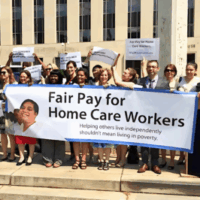New York, NY—Low-wage employers are increasingly imposing forced arbitration as a condition of employment on their workers, denying them the right to go before a judge and jury to hold lawbreaking employers accountable for wage theft. In 2019, those employers stole $12.6 billion from workers who make less than $13/hour and are subject to forced arbitration, according to a new report from the National Employment Law Project that offers a first-of-its-kind analysis of how the rise of forced arbitration is fueling the wage theft crisis.
“Forced arbitration denies workers the right to bring their case before a judge and jury, meaning they effectively lose the ability to recover wages stolen from them,” said Hugh Baran, a staff attorney and Skadden Fellow with NELP, and author of the report. “Faced with the prospect of going into forced arbitration alone, 98% of workers simply abandon their wage theft claims. Forced arbitration requirements, which routinely incorporate class/collective action waivers, allow unscrupulous low-wage employers to steal wages from workers with impunity, avoiding nearly all potential liability for wage theft.”
NELP’s analysis of the forced arbitration wage theft crisis finds:
- $12.6 billion in wages was stolen in 2019 from private-sector non-union workers earning less than $13/hour who are subject to forced arbitration. Employers using forced arbitration have effectively prevented these workers from ever recovering those stolen wages.
- 24 million private-sector non-union workers in the United States earning less than $13/hour were subject to forced arbitration in 2019.
- 25 million of these workers have experienced wage theft in the last year. Because these workers are subject to forced arbitration and typically also collective/class waivers, 98% of them —6.13 million workers—will never file a claim at all to recover their stolen wages.
- Black workers (59.1%) and women workers (57.6%) are the most likely to be subject to forced arbitration.
“My forced arbitration requirement says that the only way to get the wages I’m owed from my direct employer is to go to a third-party arbitrator—by myself—hundreds of miles from my home,” said Nancy Burgess, a Colorado-based employee who worked as a remote call-center worker and was regularly paid below Colorado’s $10/hour minimum wage. “Even if I were to jump through all those hoops and manage to win, that wouldn’t do anything for the hundreds of other employees in my exact situation. Because of my forced arbitration requirement, which includes a class/collective action waiver, my colleagues likely won’t ever recover the wages stolen from them.”
NELP’s report also finds that public agencies currently only have capacity to recover less than 4% of those wages—but only if they redirected all their resources to serving workers subject to forced arbitration. As the report explains, the opposite is happening, as the U.S. Department of Labor is deprioritizing workers subject to forced arbitration and focusing resources elsewhere.
At the federal level, the Forced Arbitration Injustice Repeal Act would end the use of forced arbitration and class/collective action waivers in employment and civil rights cases, restoring the right of low-wage workers to hold their employers accountable for wage theft and other violations. This bill passed the U.S. House of Representatives in September with bipartisan support, and is currently pending before the U.S. Senate.
States can address the lack of public enforcement capacity by passing whistleblower enforcement laws inspired by California’s Private Attorneys General Act (PAGA), such as the Empowering People in Rights Enforcement (EmPIRE) Act currently proposed in New York. These laws allow workers to stand in the shoes of their state’s department of labor and seek civil penalties for wage theft; they also generate millions in new revenue for state enforcement agencies, expanding their capacity to root out wage theft. Such legislation also has been proposed in Washington State, Oregon, Maine, Massachusetts, and Vermont.
Background on Forced Arbitration:
- Few workers are aware that they are signing away their important right to bring claims before a judge and jury when they get hired. But 55% of all private-sector, non-union employees are currently subject to forced arbitration, including 64.5% of workers earning less than $13 per hour.
- Black workers (59.1%) and women workers (57.6%) are the most likely to be subject to forced arbitration.
- Making this even worse, class/collective action waivers are routinely incorporated into forced arbitration requirements. These waivers prevent employees from banding together with their colleagues to challenge employer lawbreaking, whether in court or in arbitration.
- By 2024, it is projected that 80% of all private-sector, non-union employees will be subject to forced arbitration requirements and class/collective action waivers.[1]
- Forced arbitration heavily favors employers. Faced with the prospect of proceeding alone against their employer in a stacked forum, 98% of workers whose claims are subject to forced arbitration abandon their claims. For those few who do go to arbitration, their recoveries are significantly lower than they would be if a judge and jury heard their case.
Background on Wage Theft:
- Wage theft includes the many ways that employers steal workers’ wages, such as not paying minimum wage, not paying overtime where required, requiring workers to work off-the-clock, and stealing employees’ tips.
- Wage theft is a national crisis, and a racial and gender justice issue. Low-wage employers steal more than $50 billion from their workers annually. Black and brown workers, women, and immigrants are the most likely to experience wage theft.
Endnotes
[1] Kate Hamaji et al., Center for Popular Democracy & Economic Policy Institute, Unchecked Corporate Power: Forced arbitration, the enforcement crisis, and how workers are fighting back (2019), https://populardemocracy.org/unchecked-corporate-power.
Related to
Related Resources
All resourcesNELP’s New York City Worker Justice Agenda

Policy & Data Brief
The Case for Private Enforcement of Workers’ Rights

Policy & Data Brief
Comments on a Proposed Rule Excluding Home Care Workers from Federal Wage Protections

Comments & Letters
